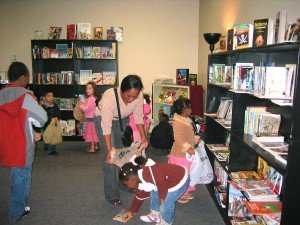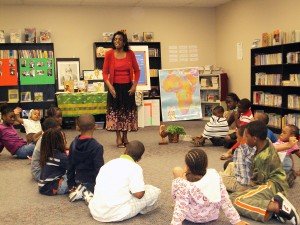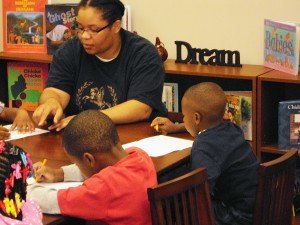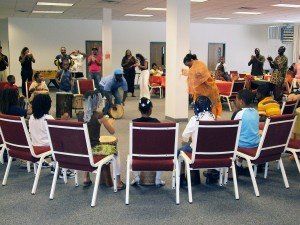By TESHA M. CHRISTENSEN
When children feel strongly connected to their culture, they do better in school, pointed out Gevonee Ford, whose 18-year-old non-profit provides a range of holistic services for children and families with the goal of connecting them to their African heritage and building towards academic success.
The Network for the Development of Children of African Descent (NdCAD) at 655 Fairview Ave. is a place where the African spirit is nurtured and renewed.
It is a place where African people come together to learn of and from themselves.
It is a place where people come to learn from their elders and children.
It is a place where they affirm their global family.
Family education center
 The family education center in the Midway neighborhood offers a variety of literacy programs with a cultural component that leads to academic success and lifelong learning, according to Ford.
The family education center in the Midway neighborhood offers a variety of literacy programs with a cultural component that leads to academic success and lifelong learning, according to Ford.
Photo left: Children select free, cultural books to keep during the NdCAD Saturday Book Giving Program that runs every Saturday from noon to 2 p.m. (Photo submitted)
Ford pointed out that research has shown that if children believe that they can learn, and if they understand the connection between literacy and culture, they will do better in school.
In 2012, Ford and NdCAD were recognized as a White House Champion of Change. The organization has also received the MLK Drum Majors of Service Award.
The vision for NdCAD emerged out of grassroots community organizing effort that took place from 1995 to 1997. Cultural Beginnings, a project of the Minnesota Department of Human Services and the Minnesota Child Care Resource and Referral Network, identified the need for building and strengthening connections within the black community. NdCAD was created to address the need for networking and community building.
 Photo right: Children participate in NdCAD’s annual summer literacy and cultural enrichment camp where children build reading skills and cultural awareness/knowledge. For example, children learn how African/African Americans have contributed to society and the world through science and technological invention,s as well as other intellectual and cultural contributions. (Photo submitted)
Photo right: Children participate in NdCAD’s annual summer literacy and cultural enrichment camp where children build reading skills and cultural awareness/knowledge. For example, children learn how African/African Americans have contributed to society and the world through science and technological invention,s as well as other intellectual and cultural contributions. (Photo submitted)
Founder Gevonee Ford remains the executive director, and has overseen the organization first in South Minneapolis, then North Minneapolis, and now the Como Midway. NdCAD was the first tenant in 2006 in the former paper warehouse owned by Living Word Church where Ford is a member.
“At each stage of NdCAD’s development,” Ford said, “the community has been involved in helping us to heal, learn and grow.”
The most important message NdCAD wants to share is that each person involved is “a part of a community that values and cares for them, and has expectations for them,” said Ford.
Since its inception, NdCAD has asked: “How do we heal, repair and strengthen the village so that the village can raise every child?”
Ford strongly believes that “each of us as community members have an opportunity to educate and develop our young people.”
Supporters include the Greater Twin Cities United Way, Saint Paul Children’s Collaborative, Ramsey County Workforce Solutions and St. Paul Promise Neighborhood, as well as individual donors. “Generous support from individuals and groups like these help make it possible for us to positively impact the lives of children and families,” said Ford.
Sankofa Reading Program
NdCAD offers a nine-week after-school program for struggling readers. The holistic approach of the Sankofa Reading Program “helps children make connections between knowledge of self and literacy,” said Ford.
The approach is working. Participants have been going up 2-5 reading levels.
 Photo left: Kindergarten to third graders participate in the Sankofa Reading Program offered at the NdCAD Educational Center in the Midway neighborhood. (Photo submitted)
Photo left: Kindergarten to third graders participate in the Sankofa Reading Program offered at the NdCAD Educational Center in the Midway neighborhood. (Photo submitted)
“Most importantly, there is increased confidence in their ability to learn which translates into better school performance,” remarked Ford.
Last year, the program served 180 students throughout the metro area.
Parent power
Concurrently with each Sankofa session is a nine- or four-week Parent Power program. The program “helps parents make literacy and cultural identity connections,” said Ford. The group also talks about how parents can work with teachers and schools.
Parent Power is built on the principle that parents are a child’s first, primary, and life-long teacher. Everything parents do at home to advance literacy has long-term effects on preparing children for success in school and life.
Through Parent Power, participants begin to challenge self-doubt and begin to think critically about how they view themselves through the eyes of others; they recognize how their self-concept impacts how they parent and teach their children. Participants also begin to deconstruct myths about themselves, African people, and their community, making invisible systems of oppression visible. Together, parents gain a deeper understanding of their innate power to bring about change in themselves, schools, and community.
 Parent Power graduates stay in frequent contact with each other through NdCAD Nia Gatherings, which include monthly activities for parents and children. Through the gatherings, families build community together, parent-to-parent and family-to-family.
Parent Power graduates stay in frequent contact with each other through NdCAD Nia Gatherings, which include monthly activities for parents and children. Through the gatherings, families build community together, parent-to-parent and family-to-family.
Photo right: Sankofa and Parent Power participants celebrate their achievements during a graduation. The community is invited to attend these events. Call 651.209.3355 for more information (Photo submitted)
Uhuru Youth Scholars
The Uhuru Youth Scholars Program offers high school students two full semesters of exploratory research experience, as well as the opportunity to earn high school and college credits.
Last year, the group focused on how the media and colonization impact how African American youth view themselves.
Students first design the project, conduct research, analyze results and present solutions. Learning these helpful skills translate into improved academic performance, and also provide students with skills for college.
“The idea is for them to take on the identity of scholars and researchers,” observed Ford.
Last year, students held focus groups in beauty salons, set up interviews with adults and youth and conducted research at several high schools.
Educator workshops
In addition to teaching, NdCAD never forgets that it is a learning organization. What it learns, it then shares with others.
NdCAD offers professional workshops for educators and others, with the goal of broadening the impact of what it has learned to increase children’s success.
Free books
Each Saturday, noon-2pm, NdCAD gives away new and gently used children’s books that focus on African culture, such as President Barack Obama’s, “Of Thee I Sing.”
Since 2001, they have put a half million books into the homes of children.
Many assume that all children have books in their homes, but that isn’t always true, pointed out Ford. Books are expensive.
“There’s nothing like when a child can pick a book, write his or her name in that book and say, ‘This is my book,’” remarked Ford. “It sends a profound message on the value the community places on children.”
Anyone who would like to donate books may drop them off at the NdCAD office between 10am-7pm Monday to Wednesday, 10am-5pm on Thursday and Friday, and noon-2pm on Saturday.
Comments
No comments on this item Please log in to comment by clicking here